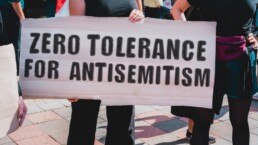Republican lawmakers increasingly conflate anti-Zionism with antisemitism in an effort limit pro-Palestine speech and criticism of Israel.
By Anna Lekas Miller, Prism
Not long after thousands of students nationwide were arrested for participating in pro-Palestine protests, the Supreme Court ruled on a case in June that could overturn the convictions of hundreds of people who participated in the Capitol insurrection.
During the June 27 presidential debate, former President Donald Trump referred to President Joe Biden as “a very bad Palestinian,” alleging that Biden—who has aided and abetted Israel’s genocide of Palestinians—did not want to help Israel “finish the job.” In preceding months, Trump also lambasted Biden for not doing enough to crack down on antisemitism on college campuses, drawing messy comparisons between the Palestine solidarity protests at Columbia University and the 2017 Unite the Right Rally in Charlottesville, Virginia. Trump falsely claimed that the hate on display at the white nationalist rally was “peanuts” compared to the hatred spewed at the Gaza protests.

These recent events fit a dangerous trend—one in which influential right-wing forces weaponize a “crackdown” on antisemitism for their own agendas while at the same time ignoring the real antisemitism in their ranks.
Ever since Jews first started settling in Israel in the late 19th century, anti-Zionist activists have been careful to distinguish between antisemitism and anti-Zionism.
Antisemitism is a hatred of Jews—the kind manifested in the Holocaust and that has resulted in sweeping generalizations and stereotypes about Jews, leading to more recent acts of violence such as the 2018 Pittsburgh Tree of Life synagogue shooting.
Recent Posts
As Security Council Stalls, There Are Other Ways to Stop U.S.-Israeli War on Iran
March 3, 2026
Take Action Now A “Uniting for Peace” resolution in the UN General Assembly can counter the Security Council’s failure to act.By Marjorie Cohn,…
States Can Block the Paramount-Warner Deal
March 3, 2026
Take Action Now But thanks to some clever maneuvering, they are already running out of time.By David Dayen, The American Prospect What started as…
Congress, Do Your Job and End This Illegal War of Aggression By The U.S. and Israel
March 2, 2026
Take Action Now Congress must assert its Constitutional authority over matters of war and peace against an out-of-control, rogue president and…
Daniel Ellsberg Speaks to Us as the War on Iran Continues
March 2, 2026
Take Action Now Ellsberg’s voice is back via a compelling new book. “Truth and Consequence,” being published this week, provides readers with his…




